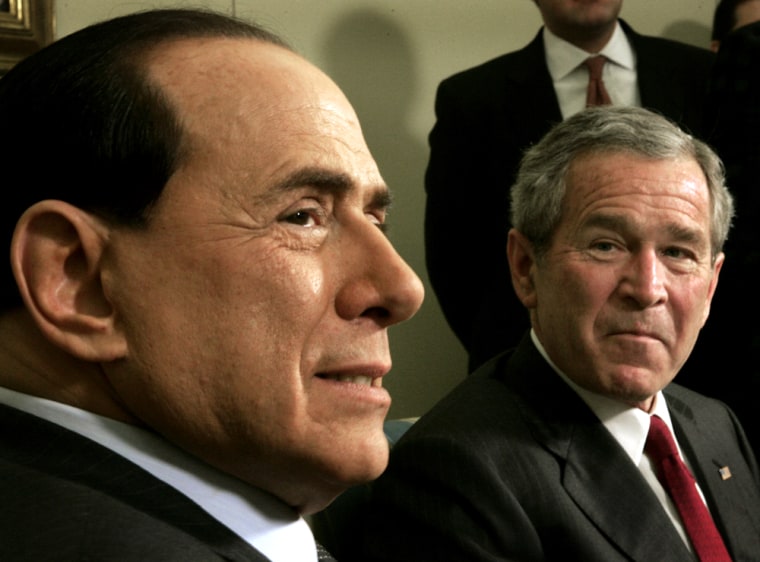Italian Prime Minister Silvio Berlusconi, facing a tough election to stay in power, got a boost Tuesday from his ally President Bush, who effusively praised Berlusconi as a strong leader who has “brought stability to the Italian government.”
Berlusconi had breakfast with Bush, followed by formal talks.
“He’s a man of his word,” Bush said of Berlusconi as they sat side by side in the Oval Office. “Obviously, it’s important for an American president to be able to work with somebody in a consistent manner and I appreciate the stability the prime minister has brought to our close ally and friend.”
Asked whether the friendly U.S.-Italian relations would continue if Berlusconi’s opponent won, Bush hastened to say that he was keeping his distance from Italian politics. Yet, he again spoke of the value of a leader with whom he has developed close ties remaining in power.
“My relationship is not a political relationship with this man. It’s a strategic relationship and this strategic relationship is important for both our peoples and it’s important to lay the foundations for peace,” Bush said. “If a government is changing every year, it requires a person in my position to constantly have to reacquaint yourself. And that’s what I meant by stability. It’s much easier to make common policy when you’re dealing with a person from one year to the next.”
“Thank you very much, Mr. President, for your words of appreciation, which give me a lot of satisfaction,” Berlusconi replied.
Bush and Berlusconi are both conservatives who came to head their governments in 2001.
A key ally in the Iraq war
Italy initially was among the most important U.S. allies in the Iraq war, having provided 3,000 troops to the effort in 2003 after U.S.-led invaders had brought down President Saddam Hussein’s government. Italy now has 2,600 troops in-country and is in the process of removing them all by the end of the year.
Berlusconi’s almost five years in power make him Italy’s longest-serving premier since World War II. His is the 59th postwar government.
But he faces a tough battle in the April 9-10 Italian elections from Romano Prodi, a former European Commission president, who defeated Berlusconi and became premier in 1996.
The Italian economy is foundering and Berlusconi’s support for the war in Iraq has been deeply unpopular in Italy. Berlusconi has expressed confidence repeatedly that he would win re-election, and recent opinion polls show him narrowing Prodi’s lead.
The Italian’s visit “is a bold move but not a defining one and may not have any effect on his political fortunes,” said Moises Naim, a specialist on Italy at the Carnegie Endowment for International Peace, a Washington research group.
Another specialist on Italy, Robert Calingaert of the Brookings Institution, a think tank, said that by closely allying himself with the United States, Berlusconi has demonstrated Italy is a major international player.
“This visit is the icing on the cake in that relationship,” Calingaert said, “and the centerpiece is the address to Congress.”
Honored by Congress
The Italian premier speaks before a joint meeting of Congress on Wednesday, then heads to New York City to receive an award for promoting freedom and democracy.
Speaking before Congress is an honor the United States accords to close allies. Others who have addressed joint meetings during Bush’s presidency include Prime Minister Tony Blair of Britain and Manmohan Singh of India and Afghanistan’s president, Hamid Karzai.
For Bush, the visit comes as his administration reels from setbacks in Iraq, criticism of its response to Hurricane Katrina, a series of criminal investigations affecting Republicans in Congress and the White House and an uproar over a deal to allow a Dubai company to manage six U.S. seaports.
Bush will try to put some of those difficulties behind him when he leaves Tuesday on a trip to India, Pakistan and possibly Afghanistan.
